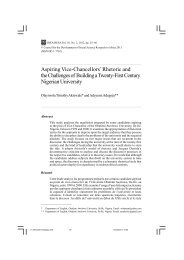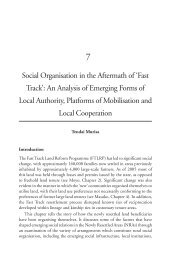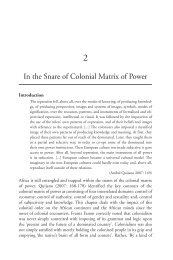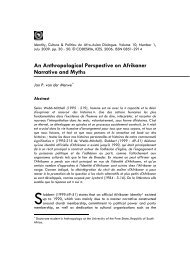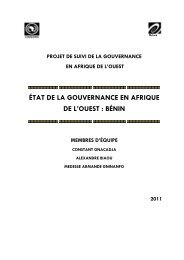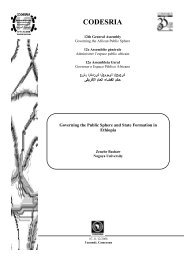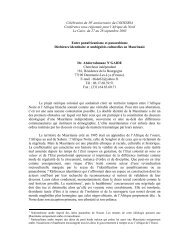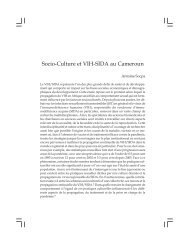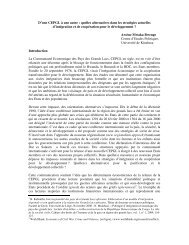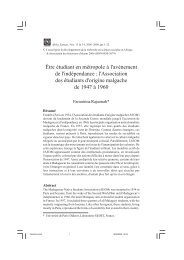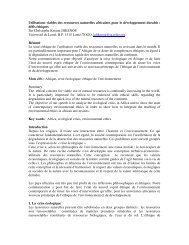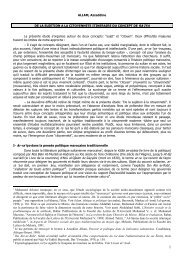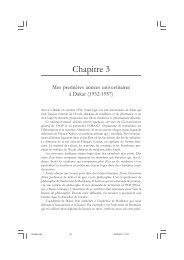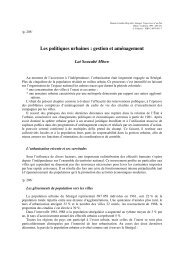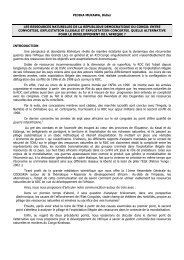and Land Tenure Reform in Uganda - codesria
and Land Tenure Reform in Uganda - codesria
and Land Tenure Reform in Uganda - codesria
Create successful ePaper yourself
Turn your PDF publications into a flip-book with our unique Google optimized e-Paper software.
Okuku : The L<strong>and</strong> Act (1998) <strong>and</strong> L<strong>and</strong> <strong>Tenure</strong> <strong>Reform</strong> <strong>in</strong> Ug<strong>and</strong>a<br />
ground rent from wealthy <strong>in</strong>vestors, which they could use to exp<strong>and</strong> <strong>in</strong>vestments<br />
on l<strong>and</strong> or <strong>in</strong> other sectors of the economy. Second, the ability of noncitizens<br />
to alienate l<strong>and</strong> from citizens poses the problem of citizens becom<strong>in</strong>g<br />
l<strong>and</strong>less. Without a parallel rapid <strong>in</strong>dustrialisation process to provide<br />
jobs, this can only spell social disaster <strong>in</strong> both rural <strong>and</strong> urban areas.<br />
The current market-driven reforms, as embedded <strong>in</strong> the L<strong>and</strong> Act, are<br />
based on a number of assumptions as far as l<strong>and</strong> tenure <strong>and</strong> development are<br />
concerned. Optimism about these reforms may be a result of theoretical carelessness<br />
<strong>in</strong> the face of empirical reality. First, it is argued that <strong>in</strong>dividualisation<br />
of l<strong>and</strong> tenure (leasehold <strong>and</strong> freehold ownership) <strong>in</strong>creases tenure security<br />
of the l<strong>and</strong>holder, thereby reduc<strong>in</strong>g the economic costs of litigation<br />
over l<strong>and</strong> disputes (Barrows <strong>and</strong> Roth 1990:268). This, as a result, provides<br />
<strong>in</strong>centives for agricultural <strong>in</strong>vestment, gives farmers access to credit, reduces<br />
fragmentation of l<strong>and</strong> hold<strong>in</strong>gs, <strong>and</strong> reduces conflict over l<strong>and</strong>, hence free<strong>in</strong>g<br />
up resources which would have been used for litigation (Platteau 1995:15).<br />
Thus, it is also presumed that <strong>in</strong>dividualisation of tenure <strong>in</strong>creases <strong>in</strong>vestment<br />
by improv<strong>in</strong>g tenure security <strong>and</strong> reduc<strong>in</strong>g transaction costs. This <strong>in</strong>creases<br />
the likelihood that the producer will capture the returns from <strong>in</strong>vestment.<br />
Second, it is assumed that <strong>in</strong>dividualisation will cause a l<strong>and</strong> market to<br />
emerge. Therefore, accord<strong>in</strong>g to this view, l<strong>and</strong> will be transferred to those<br />
who are able to extract a higher value of product from the l<strong>and</strong> as more<br />
productive users bid l<strong>and</strong> away from less productive users (Barrows <strong>and</strong><br />
Roth 1990:26).<br />
These assumptions raise a number of issues that make the correlation<br />
between title <strong>and</strong> long-term <strong>in</strong>vestment problematic. First, the use of credit<br />
for agricultural purposes may not <strong>in</strong>crease follow<strong>in</strong>g l<strong>and</strong> titl<strong>in</strong>g simply because<br />
there may be no attractive <strong>in</strong>vestment opportunities <strong>in</strong> agriculture or<br />
because some enabl<strong>in</strong>g conditions are miss<strong>in</strong>g. This typically occurs when<br />
no technological package suitable for <strong>in</strong>tensive agriculture is on offer. Second,<br />
<strong>in</strong> a situation where the required <strong>in</strong>frastructure, <strong>in</strong>put-delivery, output<br />
market<strong>in</strong>g or extension services are not available, the market-based expectations<br />
of tenure <strong>in</strong>dividualisation to br<strong>in</strong>g about development may not be realised<br />
(Platteau 1995:28).<br />
Moreover, the critical importance of other-than-tenure constra<strong>in</strong>ts makes<br />
it difficult to establish the relationship between freehold titl<strong>in</strong>g <strong>and</strong> the use<br />
of mortgages. The existence of legally registered titles, even <strong>in</strong> conditions<br />
where l<strong>and</strong> is easily appropriable, is not a sufficient condition for the <strong>in</strong>creased<br />
use of credit for agricultural <strong>in</strong>vestment as Okoth-Ogendo (1982),<br />
observed <strong>in</strong> the case of Kenya: ‘...Farmers who received l<strong>and</strong> titles did not<br />
exp<strong>and</strong> credit use because of constra<strong>in</strong>ts on the supply of credit. In some<br />
1. Anthony Okuku.pmd 17<br />
27/04/2006, 17:59<br />
17



